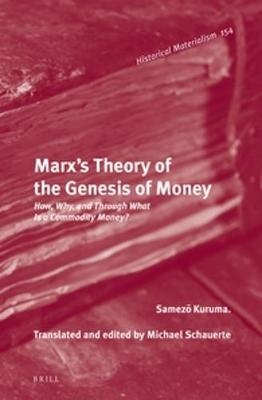
Marx’s Theory of the Genesis of Money
Brill (Verlag)
978-90-04-32238-7 (ISBN)
In this volume, Marx’s Theory of the Genesis of Money. How, Why, and Through What is a Commodity Money?, the first of the author’s works to be translated into English, Samezō Kuruma examines the different angles from which Marx analyses the commodity and money in the first two chapters of Capital, Volume I. Kuruma carefully explains each of the theoretical questions raised by Marx, particularly the theory of the value-form, which unravels the mystery surrounding money. The theoretical knowledge Marx gains from his analysis of the commodity is the linchpin of Capital, but he recognises that this presents the reader with the ‘greatest difficulty’ – just as ‘beginnings are always difficult in all sciences’. Kuruma helps to ease this difficulty by making the reader clearly aware of how and why Marx poses his theoretical questions.
This work includes an English translation of the full text of Kuruma’s book, Kachikeitai-ron to kōkankate-ron (Theory of the Value Form and Theory of the Exchange Process) (Iwanami Shoten, 1957) and a slightly abridged version of Part I of Kahei-ron (Theory of Money) (Otsuki Shoten, 1979). It is a substantially revised edition of the English translation under the same title, Marx's Theory of the Genesis of Money, that was self-published by the translator (Outskirts Press, 2008).
Samezō Kuruma, Ph.D., was a professor emeritus at Hosei University, Tokyo. He edited the multi-volume Marx-Lexikon zur Politischen Ökonomie (Otsuki Shoten). Other published works include Keizaigaku shi (History of Political Economy) and Kyoko kenkyu (Investigation of Crisis). Michael Schauerte, MA (2001), Hitotsubashi University. Translated works include Samezō Kuruma’s “A Critique of Political Economy” (2007, Research in Political Economy) and Ōsugi Sakae’s My Escapes from Japan (2014, Doyosha). He writes regularly for the monthly Socialist Standard.
Acknowledgements
Notes on the Text
Introduction to This Edition
Theory of the Value Form and Theory of the Exchange Process
Preface
1 Theory of the Value Form and Theory of the Exchange Process
2 Why is the Want of the Commodity Owner Abstracted from in the Theory of the Value Form? (A Response to the View of Kōzō Uno)
Uno’s First Argument
Uno’s Second Argument
Uno’s Third Argument
Marx’s Theory of the Genesis of Money (An Interview Conducted by Teinosuke Ōtani)
1 The Questions ‘How, Why and through What’ (The Genesis of Money)
2 Riddle of the Money Form and the Riddle of Money
3 Difference between the First and Second Edition of Capital
4 The Significance of the ‘Why Question’ (The Particularity of Commodity Production and the Essence of Value)
5 In What Sense is the Simple Value Form ‘Accidental’?
6 The ‘Detour’ of Value Expression
7 The Meaning of the ‘Formal Content of the Relative Expression of Value’ (Hegel’s Theory of Judgment and Marx’s Theory of the Value Form)
8 How the Development of the Value Form Unfolds (Neither a Historical Development Nor the ‘Self-Development of a Concept’)
9 The Meaning of Abstracting from the Individual Want of the Commodity Owner (Nobuteru Takeda’s Criticism of Kuruma)
10 What is the ‘Dialectic’ in the Case of the Value Form?
Bibliography
Index
| Erscheinungsdatum | 18.12.2017 |
|---|---|
| Reihe/Serie | Historical Materialism Book Series ; 154 |
| Co-Autor | Teinosuke Ōtani |
| Übersetzer | Edward Michael Schauerte |
| Verlagsort | Leiden |
| Sprache | englisch |
| Maße | 155 x 235 mm |
| Gewicht | 459 g |
| Themenwelt | Geschichte ► Teilgebiete der Geschichte ► Wirtschaftsgeschichte |
| Sozialwissenschaften ► Politik / Verwaltung ► Politische Systeme | |
| Sozialwissenschaften ► Politik / Verwaltung ► Politische Theorie | |
| Wirtschaft ► Volkswirtschaftslehre ► Finanzwissenschaft | |
| ISBN-10 | 90-04-32238-8 / 9004322388 |
| ISBN-13 | 978-90-04-32238-7 / 9789004322387 |
| Zustand | Neuware |
| Haben Sie eine Frage zum Produkt? |
aus dem Bereich


